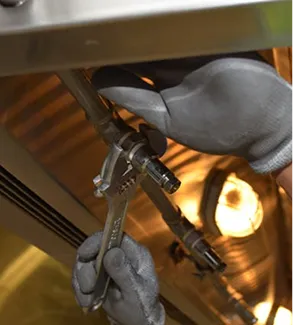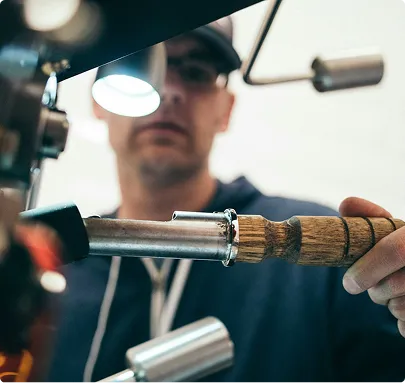When water starts pooling around your water heater, it’s more than just a small mess—it can become a serious issue if you don’t act fast. A leak usually means something inside the heater has failed or is starting to wear down. The longer you leave it unchecked, the more damage it can cause to your walls, floors, and nearby belongings. If you’re in Crandall and have a water heater at home, knowing what to do right away can help you limit the damage and control the situation better.
Many homeowners face these kinds of surprises without warning. The problem usually comes on slowly, like a small damp spot behind the unit or a low knock you barely notice. Before it turns into a bigger headache, taking the right steps can save time, money, and stress. If your water heater is acting up or leaking, being prepared can make a huge difference in how your home holds up.
Signs Your Water Heater Is Leaking
Some signs of a water heater leak aren’t always dramatic. They tend to show up slowly and might blend in with other household issues. Here’s what to look for if you suspect something’s not right:
– Water pooling near the base of the unit
– Unexplained damp spots or soft flooring nearby
– Rust forming at the bottom or on the pipes
– A dripping sound even when no water is being used
– Unexpected drop in hot water temperature
– Slight increase in your water bill with no obvious reason
Homeowners in Crandall should get into the habit of checking their water heater every now and then, especially if it’s over seven years old. Leaks sometimes come from loose connections, like the inlet or outlet pipes. But they can also come from the tank itself if it’s corroded or cracked. One local homeowner shared how a water heater leak near her laundry room went unnoticed for days because the puddles blended with normal splashes from washing. That small delay ended up soaking into the hallway and damaging a couple of floorboards.
Be on alert for any of these signs. The earlier you catch a potential leak, the easier it’ll be to fix without added costs or damage.
Immediate Steps To Take When A Leak Is Found
If you catch a water heater leak early, quick action is key to lowering the risk of further problems. Here are the steps you should take right away:
1. Shut off the power
– For electric models, look for your home’s circuit panel and switch off the breaker labeled “Water Heater.”
– For gas-powered units, turn the gas valve to the off position, usually located near the unit’s base.
2. Turn off the water supply
– Locate the cold-water intake valve—usually a lever or knob on top of the unit—and turn it clockwise to stop incoming water.
3. Dry the surrounding area
– Use towels to soak up standing water as fast as possible. This helps hold off mold and water damage to walls or slabs.
– A small wet/dry vacuum can help if the puddle is more than just surface water.
4. Inspect for damage
– Check pipes and connections for obvious signs of failure.
– Feel the base of the heater to confirm if the leak is coming from the tank itself.
Taking these steps buys you time and stops the problem from getting worse. It won’t fix the root cause, but it does make things safer until one of our technicians can inspect the unit and carry out a full repair.
How To Safeguard Your Home From Further Damage
Once you’ve turned off both the power and water supply and dried up the immediate area, your next focus should be minimizing the chance of surrounding damage. Water may already be in places you can’t easily see, like behind cabinets or under the baseboards. Small leaks can quickly lead to bigger repair costs if they’re not contained properly.
To help reduce the spread of moisture or water damage, you can:
– Position buckets under any area where water continues dripping
– Place towels or old sheets around the water heater to absorb smaller pools
– Keep the area around the heater sectioned off, especially if you have kids or pets
– Use a fan to improve airflow if the leak happened near drywall or wood
– Avoid using nearby electrical outlets until everything is completely dry
If you live in Crandall and your water heater sits near finished parts of your home—like a hallway, garage wall, or inside a laundry room—minor leaks can become prolonged problems. It’s easy to overlook a slow drip, especially during high-use months like August when frequent laundry or showers might mask subtle signs. Make sure you check nearby walls for damp spots, peeling paint, or that soft squish under your foot that signals moisture under the flooring.
Temporary steps will only work for a short time. The longer you wait, the higher the risk of water soaking into materials or collecting mold. That’s why calling our professionals should be the next step once immediate danger is controlled.
Why Professional Repair Is Essential
Homeowners might think they can handle water heater issues with a quick patch, but most of the time these issues point to something internal—like a corroded tank or faulty temperature-pressure valve—that can’t be fixed without the right tools and training. Even small leaks can be signs the tank is getting close to failure.
Our technicians are trained to identify both the visible and hidden problems, which helps prevent the same issue from coming up again. What looks like a loose joint or valve may be a small part of a larger concern. For example, if corrosion has started on the inside of the tank, the leak is just the beginning. Fixes that only stop surface water without addressing the actual breakdown inside will only buy you limited time.
Another point to consider is the risk to your home’s water supply. Mishandling repairs, especially with pressure valves or internal connections, puts plumbing systems at risk and may even affect other fixtures in the house. This is why our technicians provide complete inspection before making any repair—from checking the tank all the way to testing connections and pressure levels.
Keep in mind, trying to fix a leak without the right equipment and background can actually make the problem worse. Instead of dealing with extra utility bills, damaged floors, or another burst later on, get it handled right the first time with trained help.
Keeping Your Crandall Home Safe From Repeat Leaks
When dealing with a water heater leak, the goal isn’t just stopping the water—it’s understanding what caused it in the first place and making sure it doesn’t happen again. Acting quickly, limiting water spread, and letting our professionals take over helps avoid long-term issues.
Leaks don’t always give you a warning sign that you’ll catch in time. That’s why regular checkups on your water heater—especially one that’s more than a few years old—can keep you one step ahead. A clean space around the unit, listening for small drips, and checking valve connections once in a while can help you notice an issue before it leads to damage.
If you live in Crandall and want to lower your chances of another water heater problem, it’s a smart move to schedule inspections and fix minor issues early. Staying on top of repairs and keeping the system maintained means fewer emergencies and less disruption at home.
Mack’s Plumbing, TX LLC understands that water heater leaks can quickly become a major disruption in your home, and if you suspect you may need water heater repair in Crandall, it is wise to act without delay, as our professionals can help prevent additional damage and ensure your system runs safely. For a quick estimate or to book a service visit, please contact us today.

Customer Testimonials

Financing
We make it easy to get the plumbing services you need with flexible financing options through Wisetack, including zero down plans with approved credit.







